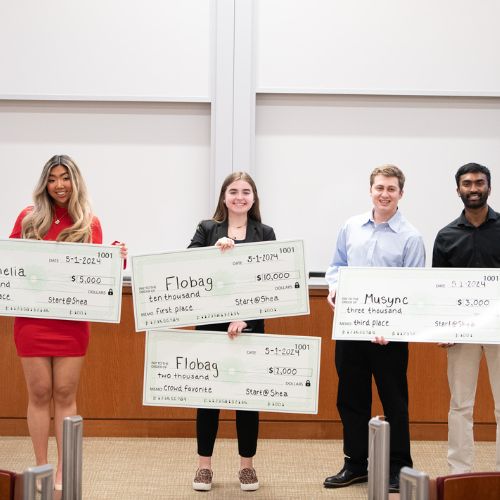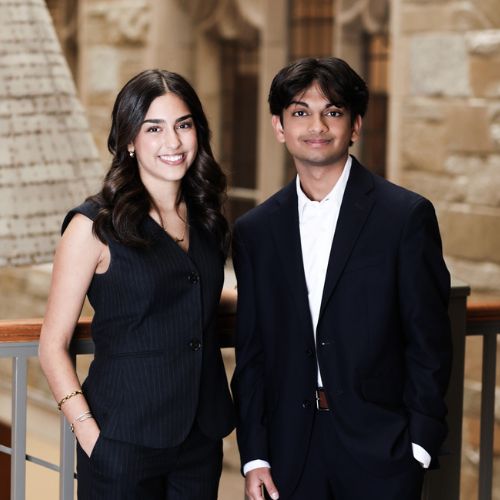Springtime in Chestnut Hill means tulips sprouting around campus and libraries full of students studying for finals. For some students, it’s also a time of fierce competition—at events sponsored by the Joseph E. Corcoran Center for Real Estate and Urban Action and the Edmund H. Shea Jr. Center for Entrepreneurship.
Fifty teams from 23 universities across the country submitted their proposals for real estate developments to the Corcoran Center Case Competition in April, but it was a team from Boston College that took home first place—the first BC team to win the competition since it became intercollegiate in 2021.
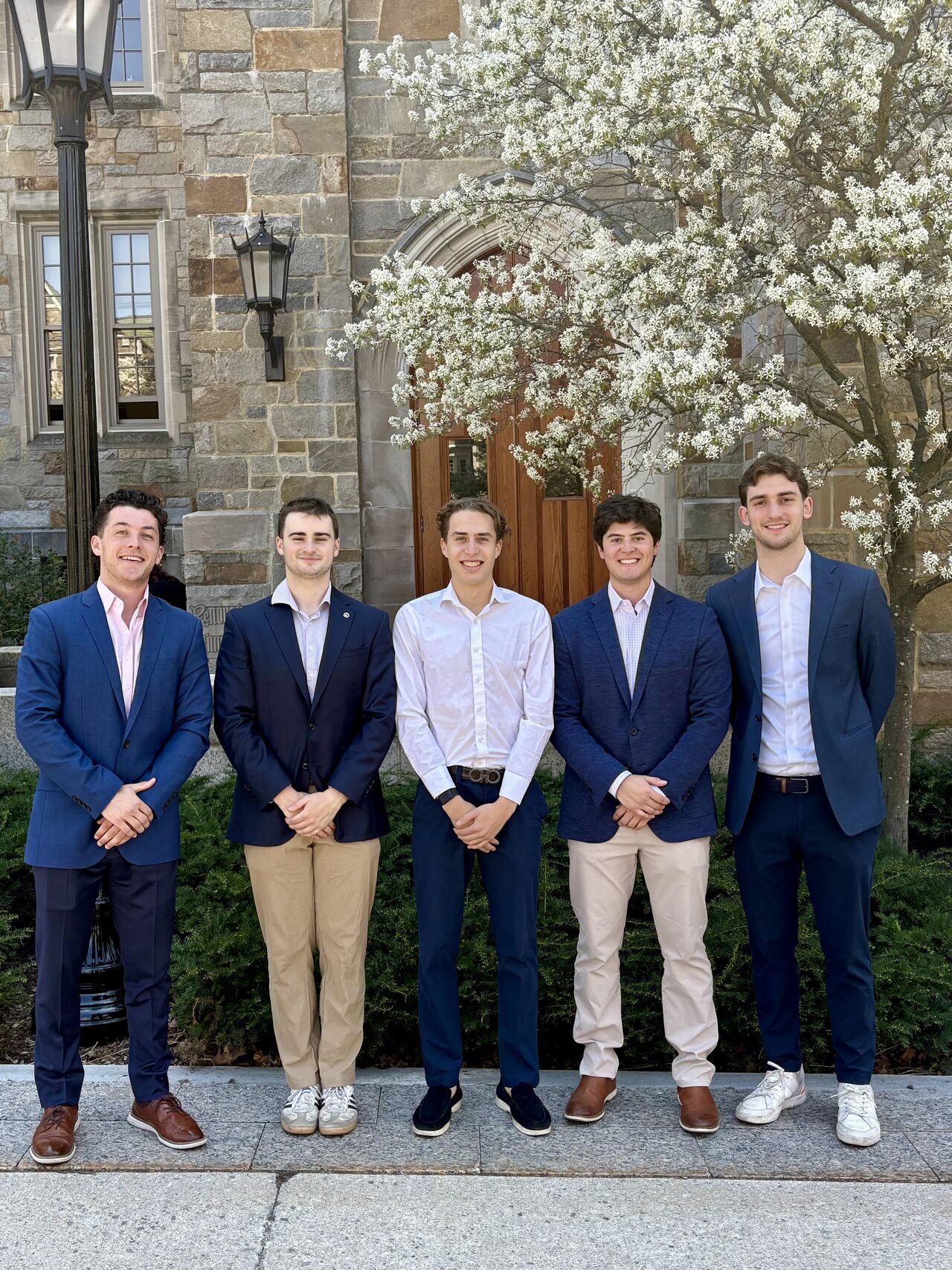
The winning team of the 2025 Corcoran Center Case Competiton, Regatta Grove.
Now in its seventh year, the case competition offers undergraduate students a hands-on opportunity to analyze real-world communities and propose solutions to serious affordable housing challenges. Past prompts have asked students to consider the needs of unhoused veterans in Los Angeles, and identify solutions for housing shortages in cities like Nashville, Tennessee, and Madison, Wisconsin. This year, students were tasked with proposing a development plan to address the lack of affordable housing in Jacksonville, Florida, which is home to several historically underserved communities.
Acting as a real estate development firm, each team submitted a proposal for a new affordable housing development that considered the unique opportunities and challenges of Jacksonville’s Eastside neighborhood. That includes its rich history and cultural ties to the African American community, as well as its economic disparities, lower household incomes, and high poverty rates.
The winning team, named Regatta Grove, was comprised of Carroll School students Grayson Harkness ’26, Paul Leonelli ’26, and John Minich ’25, along with MCAS students Fernando Schwartz ’28 and Patrick Staff ’26. They explained that their mission was “to transform Jacksonville’s historic Eastside through thoughtful, community-rooted development.”
Their proposed development, named Midway Commons as a nod to the nearby spiritual landmark Mother Midway Church, was a mixed-use housing development with sustainability initiatives and creative partnerships with local community programs. “Culture and storytelling are really central to how we thought about building trust with the community,” the team explained during their final-round presentation. “Midway Commons isn't just about building housing, it's about strengthening a community.”

Regatta Grove and the three other teams selected for the final round were given 15 minutes to virtually present their proposals, followed by 15 minutes of questioning from the judges panel, which included community development professionals Michael Williams (Purpose Built Communities), Stacy Kaplowitz (Lincoln Avenue Communities), and Whitney Weller (formerly of Brinshore Development).
Judges took notice of the thoughtful details in Regatta’s proposal, including the space allocated to a local early learning center, a green roof to reduce the urban heat of the city, and a mural commissioned from local artists. “That just pulled at my heart strings,” Kaplowitz said of the artistic collaboration, commending the team for putting thought and meaning behind the small details of the proposal.
It was these thoughtful additions that ultimately secured the Boston College team the first-place prize of $5,000. The University of Wisconsin-Madison came in second place, winning $2,500. Marquette University and Penn State University took home $1,500 and $1,000 for their third and fourth place finishes, respectively.
“This year's winning team is a group of talented and bright students,” says Corcoran Center executive director Neil McCullagh, adding that the team’s members have been heavily engaged in real estate education through the center. “It was so exciting to have a BC team take first place in the competition for the first time since it’s been opened up to participants from other schools. I am so proud of their effort and dedication to working through the case challenge.”
Here Comes the Pitch
The Corcoran Center wasn’t the only place for tough competition this spring. The annual Strakosch Venture Competition, hosted by Start@Shea and the Edmund H. Shea Jr. Center for Entrepreneurship, brought the most competitive lineup yet, says Kelsey Renda, the center’s senior associate director.
More than 55 teams applied for a shot at one of eight slots in the competition final, which took place in late April. Those eight teams had four minutes to pitch their business plans, followed by six minutes of Q&A with a panel of judges made up of entrepreneurship experts including Tom Jennings ’95, Mike Farber, Cory Munchbach, MCAS ’09, and Emily Kaiser ’14.
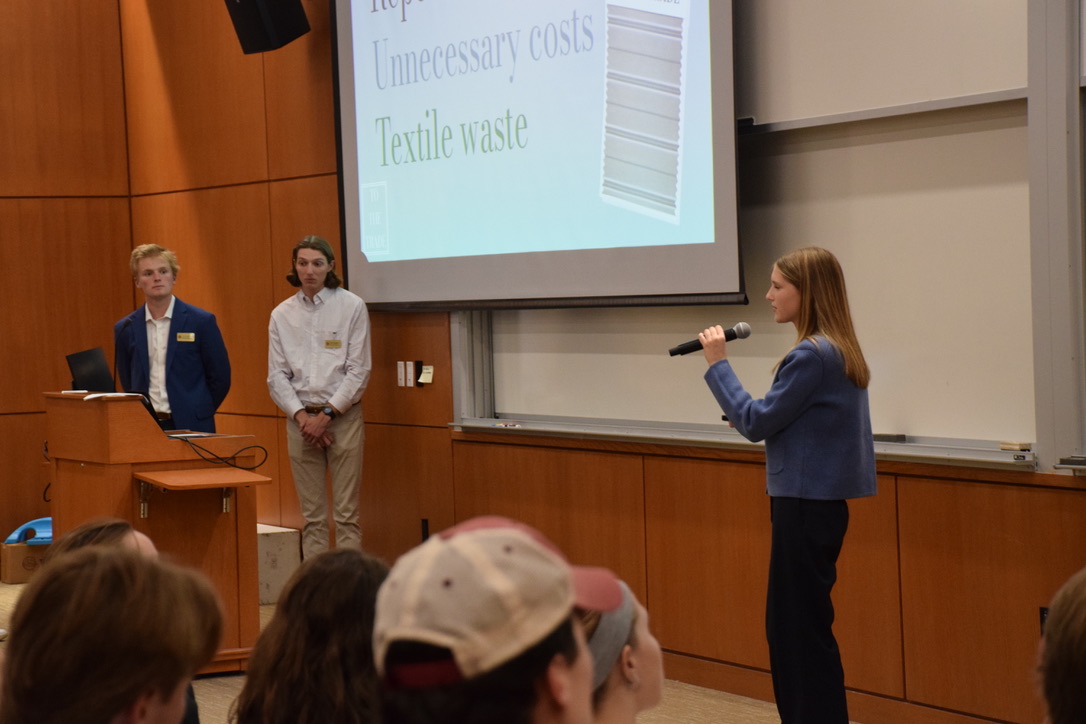
Emma Mooney '28 presenting at the Strakosch Venture Competition.
Carroll School rising sophomore Emma Mooney ’28 took home first place and a prize of $10,000 in equity-free funding for her business idea, To The Trade, an online platform that would streamline product sample ordering for interior designers. Mooney was inspired to create To The Trade after spending time working for an interior design firm and seeing the inefficiencies in sourcing samples of materials like fabric and wallpaper.
Last fall, Mooney won first place in the Shea Center’s annual Elevator Pitch Competition with the same concept—then called Lorraine Library—and went on to participate in the center’s accelerator program Accelerate@Shea. Mooney told Carroll School News that getting involved with the Shea Center’s programming has “had a huge impact on how I’m spending my time and how I want to approach my future.” She is currently developing the website for To The Trade with a freelance designer.
Juliana Owen ’25 took home second place with JO, her concept for a line of leather bags that can go from 2D cutouts to 3D objects with just a few folds and no sewing. During her pitch, Owen showed off the prototypes for a tote bag and a handbag, which blends sculptural design with practicality—perfect for people who may have limited closet space or travel often.
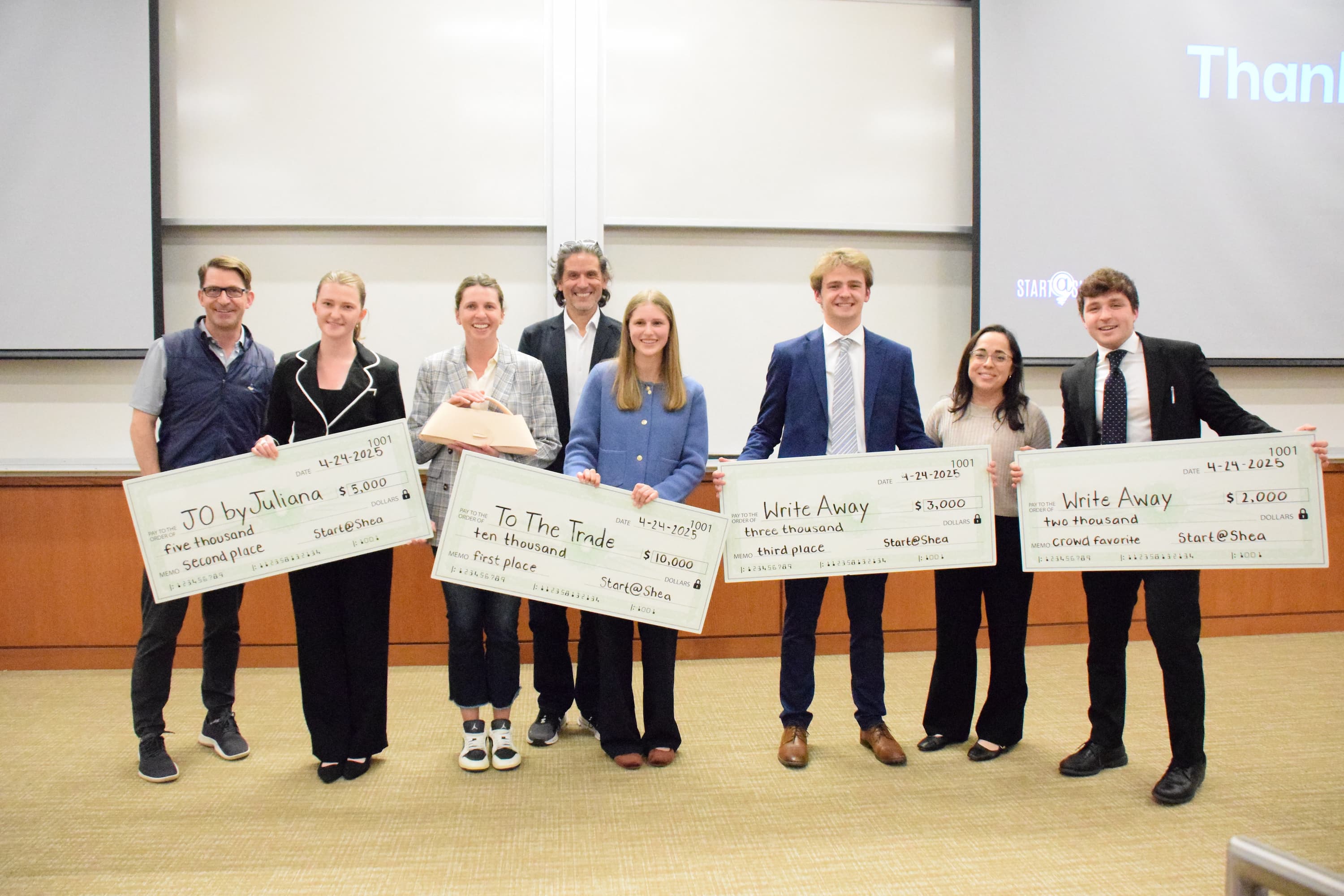
Strakosch judges and winners.
Owen, a marketing and studio art double major, came up with the concept for her bags while developing her senior art thesis project. As a seventh generation artist, she said that she has always wanted to “design something that no one else has ever seen before.”
Dominic Landry ’28 and Drake Cote, MCAS ’28, were awarded both third place and the crowd favorite award for their concept, Write Away, which aims to develop customized stencils featuring an individual’s signature, designed to aid people living with disabilities who may not be able to sign their own names independently.
Landry, who worked at the Perkins School for the Blind throughout high school, has firsthand experience working with people with disabilities and witnessed their frustration around tasks like signing official documents. The pair shared that they hope the concept for Write Away can give disabled individuals a sense of independence—and their individuality back.




